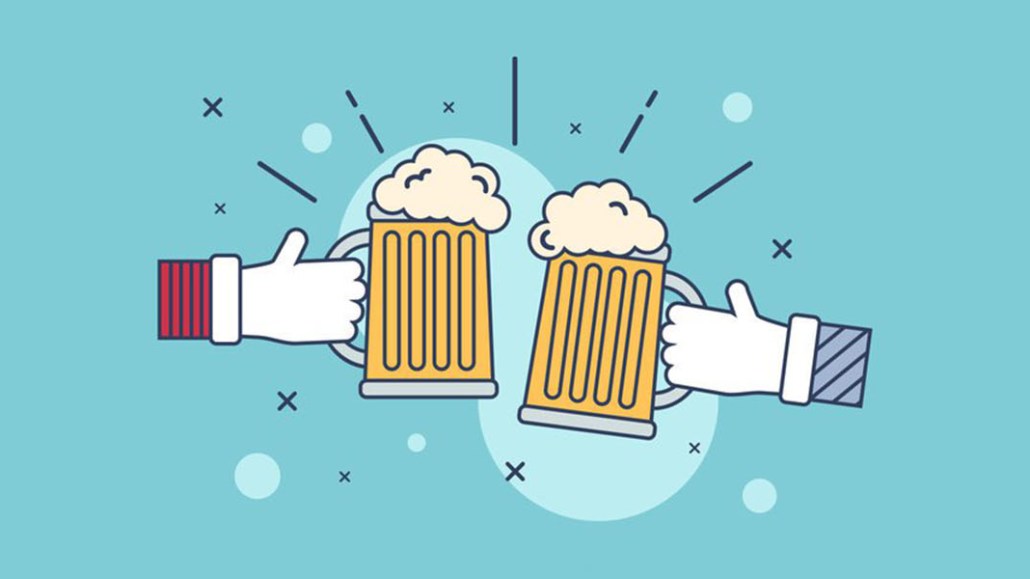Save 50% on a 3-month Digiday+ membership. Ends Dec 5.
Heineken takes its non-alcoholic beer to the Super Bowl as competition to be the category leader brews

For the first time in decades, beer makers and spirits brands are able to advertise during the Big Game as Anheuser-Busch has given up its category exclusivity for the Super Bowl. Heineken is using the opportunity to tout its non-alcoholic beer, Heineken 0.0, with a 30-second spot that will appear during the first half of the game.
Super Bowl LVII will take place on Feb. 12 in Glendale, Arizona and air on Fox. The network is asking $7 million for 30-second spots.
“It’s about making moderation normal, useful and cool,” said Borja Manso, Heineken USA’s vp of marketing, adding that when the brand launched in the U.S. in 2019 the “non-alcoholic beer category was and is still so small. It’s about educating consumers and creating a category.”
That Heineken is using the Super Bowl to make sure its non-alcoholic offering is front and center during one of the few events where consumers are paying attention to the ads is likely a sign that competition is heating up in the non-alcoholic space. Alcohol brands like Samuel Adams, Tito’s Handmade Vodka and more have been rolling out ads and products around Dry January to stay relevant despite the rising trend of restricted alcohol consumption for the month. At the same time, upstarts like Bare Zero Proof and Free AF are aiming to be category leaders when it comes to non-alcoholic cocktails.
The heightened push to be the breakout non-alcoholic brand makes sense considering consumption of non-alcoholic beer alternatives is up significantly. Per restaurant food and beverage research firm CGA’s data, consumption of non-alcoholic beer in January 2022 was 29%, up from just 5% in 2019. Meanwhile, mocktails accounted for 7% of consumption in January 2019 and were 23% in 2022.
“With our recent win for Just the Haze as the best non-alcoholic beer in the country at the Great American Beer Festival, we were excited to continue showing drinkers and beer lovers alike that we have a great non-alcoholic option that doesn’t sacrifice on taste,” said Lauren Price, director of marketing at Samuel Adams, when asked about the beermaker’s push to grow its non-alcoholic brand this month.
Price continued: “It’s a big focus for us this year as we listen to drinkers’ evolving preferences and continue to see category growth with the rise of sober curiosity and pacing.”
Ad position: web_incontent_pos1
Marketers and agency execs expect the category to continue to grow as younger generations are more and more focused on wellness. With that being the case, marketers will aim to appeal to the shifting nature of the generation’s preferences, offering mocktails, non-alcoholic beers and spirits as well as potentially encouraging non-alcoholic parties, noted Lori Golden, director of national accounts for creative shop The Marketing Arm.
“Wellness-focused Gen Zs have been leading the ‘sober-curious’ movement for the last several years, prioritizing refreshed mornings over drunken, late nights,” said Amanda Shapiro, Deutsch LA svp, group strategy. “The category is full of celebrity-backed entrants like Bella Hadid’s Kin, and Katy Perry’s De Soi. And now big brands are catching up in a big way, mainstreaming this movement for 2023.”
Even as more marketers are seeing the value in non-alcoholic options, there’s yet to be a category leader, noted Shapiro, which may be why there’s increased marketing efforts among brands during Dry January this year.
“It’s anyone’s game,” said Shapiro. “It doesn’t take a zero-proof positioned brand to capitalize on this trend. It creates an opportunity for other non-alcoholic brands to fill the void booze is leaving behind.”
More in Marketing

Ulta, Best Buy and Adidas dominate AI holiday shopping mentions
The brands that are seeing the biggest boost from this shift in consumer behavior are some of the biggest retailers.

U.K. retailer Boots leads brand efforts to invest in ad creative’s data layer
For media dollars to make an impact, brands need ad creative that actually hits. More CMOs are investing in pre- and post-flight measurement.
Ad position: web_bfu



